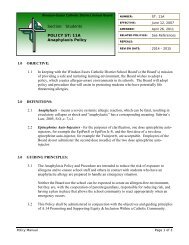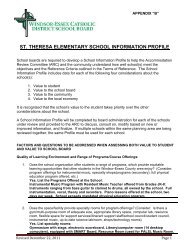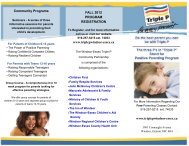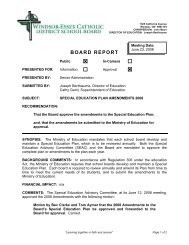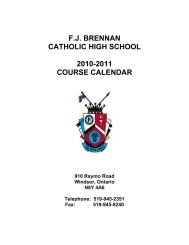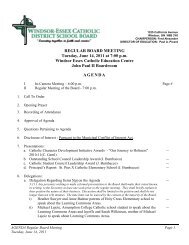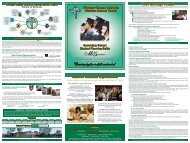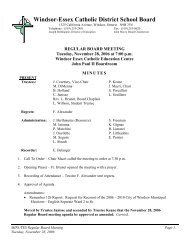Guide for Hosts
Guide for Hosts
Guide for Hosts
Create successful ePaper yourself
Turn your PDF publications into a flip-book with our unique Google optimized e-Paper software.
Host <strong>Guide</strong>:<br />
Welcome to the CHI host program. This<br />
guide <strong>for</strong> host families has been prepared with<br />
the counsel and insight of hosts like you – and<br />
students like yours – over more than ten years<br />
of working with international students in<br />
communities across Canada. We hope it will<br />
answer many of your questions—and if it<br />
doesn’t, we hope you’ll tell us.<br />
The Homestay Experience<br />
Every year, Canada Homestay International<br />
welcomes thousands of high school and mature<br />
students from around the world to Canada. They<br />
range in age from 10 to 60 years old. Their studies<br />
last anywhere from a single week to a whole year,<br />
at public schools, community colleges, universities<br />
and private language centers; their schools are<br />
located in small towns and large cities across the<br />
country.<br />
Our students want to experience life as part of a<br />
Canadian family—to learn English in a caring<br />
environment, to have a home away from home. Our<br />
hosts are excited to welcome someone new into<br />
their lives. They want to learn about another<br />
culture—and to see their own culture in a new<br />
light—through a <strong>for</strong>eign visitor’s eyes.<br />
What makes a great homestay?<br />
- A sensitive and patient family.<br />
It can be overwhelming <strong>for</strong> a student to be so far<br />
away from home. A thoughtful host family<br />
appreciates that each student is unique, and that<br />
communication and mutual understanding take<br />
ef<strong>for</strong>t. Some students may be outgoing and<br />
independent; others may participate more actively<br />
in your family life. Either way, a kind host treats<br />
the student like one of the family, keeping the lines<br />
of communication open.<br />
The Homestay Experience _______________________1<br />
What makes a great homestay? ________________1<br />
What to Expect ______________________________2<br />
Getting Settled ________________________________2<br />
A Tour of Your House _________________________2<br />
A Tour of the Neighborhood & Local Transit _______2<br />
Household Rules _______________________________3<br />
Household Rules and Customs __________________3<br />
Pocket Money & Valuables ____________________3<br />
Telephone & Internet _________________________3<br />
Visitors & Travel _____________________________4<br />
Sharing Your Life ______________________________4<br />
Meals _____________________________________4<br />
Conversation _______________________________5<br />
Using English Day-to-Day ______________________5<br />
Keeping Language Practice Fresh ________________5<br />
Techniques <strong>for</strong> Mutual Understanding ___________5<br />
Common Challenges ____________________________6<br />
Communication & Happy Compromise ___________6<br />
Persistent Problems __________________________6<br />
Why Would a Student Be Moved? _______________6<br />
Medical Emergencies ___________________________7<br />
Final Thoughts ________________________________7<br />
A Host's Perspective ____________________________8<br />
CHI Contact In<strong>for</strong>mation _______________________10<br />
Our hosts are interested in sharing their lifestyle in<br />
a positive and mutually rewarding way. When you<br />
accept a student, your role as a host family is to<br />
welcome the student as a new member of the<br />
family.<br />
We do not accept hosts who are interested in<br />
money alone. These motives are obvious to<br />
students, and interfere with the intended homestay<br />
experience: a safe, secure, welcoming environment<br />
to learn and grow in. Furthermore, hosts who take<br />
students solely <strong>for</strong> income seldom enjoy the<br />
hosting process. We want this to be a fun learning<br />
experience <strong>for</strong> everyone involved.<br />
© 2011 CHI/CANADA HOMESTAY INTERNATIONAL 1
Having an international student in your home<br />
takes time, patience, and a willingness to share.<br />
There are many differences to overcome, both<br />
cultural and personal—but learning about these<br />
differences and celebrating them is part of the joy<br />
of welcoming someone into your home—and, in<br />
many cases, making a new friend <strong>for</strong> life. So, be<br />
yourself and have fun!<br />
What to Expect<br />
Besides providing meals, a host has a significant<br />
role in the successful development of a student’s<br />
English skills. It is very important that students be<br />
included in family activities, outings, discussions,<br />
and so on. This makes the students feel like part of<br />
the family at the same time as it exposes them to<br />
English in a natural environment.<br />
You may find the students somewhat shy at first. If<br />
you find them spending a lot of time alone, try to<br />
organize an activity to do together like shopping,<br />
cooking dinner, or walking the dog.<br />
You will notice certain cultural differences. When<br />
you do, please be as gentle and understanding as<br />
possible, keeping in mind that there are often no<br />
right or wrong ways of doing something, only<br />
different ways. Of course, each culture has its own<br />
norms and social etiquette. If you notice your<br />
student doing something unacceptable in terms of<br />
Canadian culture or social etiquette, please let<br />
them know in a kind and helpful way.<br />
Getting Settled<br />
Upon arrival, introduce the student to all members<br />
of your family. Repeat the names so they can<br />
remember. Make sure they have your address and<br />
phone numbers (home and work) on a sheet of<br />
paper—they should keep this with them at all<br />
times. Then show them around.<br />
A Tour of Your House<br />
Please give the student a tour of your house and<br />
show them where everything is, with special care<br />
to show them the essentials, including their<br />
bedroom and bathroom; the kitchen and dining<br />
area; the laundry room; the linen closet (or<br />
wherever you keep your clean linen and towels);<br />
and so on. Please make it clear how to use:<br />
• The washer and dryer (provide them with any<br />
necessary supplies);<br />
• The fire extinguisher and what to do in case of<br />
fire;<br />
• Appliances and entertainment, like the<br />
dishwasher, TV, microwave, computer etc.;<br />
• The telephone (911 should be posted by the<br />
phone and its use explained).<br />
Without your instructions, your student won’t<br />
know if and how they can make themselves at<br />
home! Your student should arrive to find their own<br />
bed, closet space and a place <strong>for</strong> studying, as well<br />
as clean towels and linen.<br />
Please respect their right <strong>for</strong> privacy when they are<br />
in their room. Always knock and announce yourself<br />
be<strong>for</strong>e entering their room. Do not go into their<br />
rooms when they are not at home without their<br />
permission.<br />
A Tour of the Neighborhood & Local Transit<br />
Please ensure that your student has proper<br />
directions to and from their school and to any local<br />
attractions or meeting place, if they going out with<br />
friends or on a school outing.<br />
Please show your student the route to and from<br />
your home to their school, be<strong>for</strong>e they start classes<br />
on the first day of school. Many hosts give their<br />
students a note of the bus number and route; you<br />
might also let them know how to use a public<br />
telephone and to dial 911, in the event of a<br />
personal emergency. If you are unable to show<br />
your student to their school be<strong>for</strong>e their first day<br />
and cannot arrange anyone else to help, please<br />
contact CHI <strong>for</strong> assistance.<br />
© 2011 CHI/CANADA HOMESTAY INTERNATIONAL 2
If your student is part of a short-stay group, you<br />
may be required to drive (or accompany them by<br />
bus) to and from school. Your CHI representative<br />
will discuss this with you.<br />
Household Rules<br />
All of the rules or guidelines that apply to your<br />
family members will also apply to your student.<br />
You set the curfew, dinner times, etc.—life should<br />
go on as usual with your new guest. It is often<br />
beneficial to have a full family meeting to go over<br />
the house rules at the beginning of each student’s<br />
stay.<br />
For students under the age of majority, we ask that<br />
you uphold the following rules in addition to your<br />
household customs:<br />
• All students are expected to be home on or be<strong>for</strong>e<br />
6:00 p.m. <strong>for</strong> dinner on school nights.<br />
• Students must observe weekend curfews (Friday<br />
and Saturday). Earlier times may be set, however,<br />
depending on circumstances:<br />
• Grades 6 – 8: 9:30 p.m.<br />
• Grade 9: 10:00 p.m.<br />
• Grade 10: 11:00 p.m.<br />
• Grade 11: 11:30 p.m.<br />
• Grade 12: 12:00 a.m.<br />
• No smoking or purchasing of cigarettes<br />
• No drinking<br />
• No driving or owning of motorized vehicles<br />
Each host must ensure that their students<br />
understand and respect their house rules and<br />
guidelines. If you are having difficulty doing so,<br />
please contact us <strong>for</strong> assistance.<br />
Household Routines and Customs<br />
As soon as you feel it is appropriate, please explain<br />
your household routines. These include:<br />
• habits and preferences concerning baths and<br />
showers (bathroom etiquette is sometimes very<br />
different elsewhere in the world);<br />
• keeping their bedroom and bathroom tidy;<br />
• assisting with daily chores (cooking, dishes);<br />
• where food can or cannot be eaten;<br />
• doing laundry;<br />
• curfew <strong>for</strong> your children (if any);<br />
• your smoking (or non-smoking) policy;<br />
• limits on the television/stereo/VCR and the use<br />
of other family property;<br />
• family schedules, including bedtime hours; and<br />
• notifying family of whereabouts and guests etc.<br />
Please advise them if there is something that you<br />
would prefer to keep “off limits”.<br />
Pocket Money & Valuables<br />
While many students are experienced travelers<br />
who are savvy with money, some are not. Students<br />
are normally advised not to bring or display a lot of<br />
cash. If your student does bring a large sum of<br />
cash, please encourage them to turn it into<br />
traveler’s cheques to minimize the risk of theft.<br />
Please remind them that they will need their<br />
passports to cash traveler’s cheques and, in some<br />
cases, in order to get an advance on the their Credit<br />
Card from a bank teller.<br />
If the student is here <strong>for</strong> a long stay, we<br />
recommend that you please help them to set up a<br />
bank account at your local bank. Please do not<br />
make loans to your student. Please notify CHI if<br />
you sense that your student is short of funds; we<br />
will contact their parents about their finances.<br />
Please make sure your students put their valuables<br />
(eg. passport) in a safe place. It is a good idea to<br />
make a photocopy of important documents<br />
(passport, insurance papers and traveler’s<br />
cheques).<br />
Telephone & Internet<br />
Please provide reasonable use of the phone <strong>for</strong><br />
local calls. To avoid any complications over<br />
payment, it is quite reasonable to expect your<br />
students to purchase a calling card <strong>for</strong> long<br />
distance calls. These offer great value and are<br />
widely available in convenience stores.<br />
© 2011 CHI/CANADA HOMESTAY INTERNATIONAL 3
Your students will expect internet access in the<br />
home, and all students are expected to bring their<br />
own computers. There is no extra fee charged to<br />
them or paid to the host family <strong>for</strong> internet service.<br />
Many students bring their own computers and<br />
some will be quite savvy computer users. CHI<br />
discourages students from using their hosts’<br />
computers. If you decide to let your student use<br />
your home computer or provide them with access<br />
to the internet, please tell your student the<br />
guidelines that you have established <strong>for</strong> its use,<br />
including any restrictions that affect your children<br />
(to certain sites or times, <strong>for</strong> example), and the<br />
time available to the student, during the day or<br />
night and <strong>for</strong> how long.<br />
CHI advises hosts to monitor the kind of activity<br />
your student engages in online, and to discuss<br />
online habits together. Downloading movies,<br />
watching television online, chatting with friends,<br />
and playing video games can all be done safely,<br />
legally and may offer benefits in healthy<br />
moderation. However, each of these activities can<br />
also create headaches <strong>for</strong> students and hosts alike<br />
if approached carelessly. For more in<strong>for</strong>mation on<br />
potential dangers and annoyances of computer<br />
usage, please consult your local Relationship<br />
Manager.<br />
Please be aware that most internet service<br />
providers in Canada bill user accounts according to<br />
how much bandwidth their home uses. Many of<br />
our students come from countries where<br />
bandwidth limits and over-usage fees do not exist.<br />
Your internet service provider can help you<br />
manage usage by notifying you when your account<br />
is at a particular threshold of your allotted monthly<br />
usage. Please contact your service provider <strong>for</strong><br />
more in<strong>for</strong>mation.<br />
Visitors & Travel<br />
CHI recommends that students not be permitted to<br />
have overnight visitors, with or without payment.<br />
Students under the age of 18 are not permitted<br />
overnight visitors or visits.<br />
If you have to go out of town suddenly and cannot<br />
take the student with you, please notify CHI and we<br />
will help you to make alternate arrangements.<br />
Also, if you are planning a family vacation and your<br />
student is not able or invited to go, please notify<br />
CHI as soon as you can, so alternate arrangements<br />
can be made <strong>for</strong> that student to have somewhere to<br />
stay while you are away.<br />
Do not travel with your Student across the<br />
Canadian border. Some students do not have the<br />
necessary documentation or visas and may be<br />
refused entry or re-entry.<br />
Students under the age of 18 are not allowed to<br />
travel on their own out of your town, except with<br />
the written permission of their parents. Please<br />
contact CHI if a student under the age of 18 wishes<br />
to travel outside your town, even it is with their<br />
school.<br />
Sharing Your Life<br />
The essence of the homestay experience is sharing<br />
your life with your student, from meal times to<br />
family outings.<br />
Meals<br />
Please prepare balanced and nutritious meals,<br />
daily. Serve your usual fare, but please take note of<br />
what they are eating. They may be too<br />
embarrassed to let you know if there is something<br />
that they don’t like! It may be hard to know what<br />
your student likes and dislikes, but by asking<br />
specific questions or taking them along on a<br />
shopping trip you will learn a lot. Be sure to ask<br />
your student if they have any food allergies or<br />
medical conditions that you need to be aware of.<br />
If you would like them to help themselves to food<br />
and drink, please make sure that they understand<br />
this and show them where they can find specific<br />
foods, such as snack food, cereal, and so on. If you<br />
© 2011 CHI/CANADA HOMESTAY INTERNATIONAL 4
leave them to find food themselves, they may wait<br />
to be offered something every time.<br />
“Com<strong>for</strong>t foods” can go a long way <strong>for</strong> world<br />
travelers! You might want to buy your student<br />
something familiar from home from time to time. If<br />
you’re feeling adventurous, you might consider<br />
asking your student to dinner at a restaurant<br />
serving cuisine from their country. This can be a<br />
fun evening of role-reversal: you can be the visitor<br />
and they can be the guide.<br />
Conversation<br />
Not surprisingly, students are often apprehensive<br />
and insecure about expressing themselves in<br />
English. Please be patient, and ready <strong>for</strong><br />
misunderstandings!<br />
Our students have come to Canada precisely to<br />
become more confident and assertive in English,<br />
and they need (and expect) to be able to practice<br />
what they learn at school at home, with their hosts.<br />
Using English Day-to-Day<br />
You may find it helpful to include the student/s in<br />
as many simple daily activities as possible, such as:<br />
• conversation, especially at dinner;<br />
• setting the table, meal preparation, gathering,<br />
etc.;<br />
• accompanying you on errands (a trip to the<br />
grocery store is an interesting event <strong>for</strong> many<br />
students and helps you to discover their favourite<br />
foods);<br />
• inviting your student to join you when exercising;<br />
• watching TV programs that stimulate<br />
conversation or sharing of ideas.<br />
Keeping Language Practice Fresh<br />
It is also helpful to encourage situations that will<br />
include other members of the household, such as:<br />
• share your family photo albums/videos<br />
• play cards/board games (ask them to teach you<br />
one)<br />
• help students to plan their outings<br />
• have a picnic with your student, instead of<br />
staying in<br />
• plan activities together and mark them on the<br />
calendar: students like to know their family plans<br />
to do things with them, and this method helps<br />
ensure everyone is interested in the activity.<br />
Techniques <strong>for</strong> Mutual Understanding<br />
There are a few simple techniques to employ and<br />
traps to avoid in facilitating communication with<br />
your student:<br />
• Encourage your students to talk about<br />
themselves with open-ended questions like “What<br />
sports do you enjoy?” or “Tell me about your<br />
family.” Avoid yes/no questions.<br />
• Avoid negative questions such as, “You don’t like<br />
watching movies?” or “Didn’t you like the lasagna?”<br />
• Avoid asking, “Do you understand?” Students will<br />
ordinarily answer, “Yes” <strong>for</strong> the sake of harmony!<br />
Instead, ask the student to tell you what they think<br />
you are saying — as a test <strong>for</strong> you, not <strong>for</strong> them!<br />
Begin by asking <strong>for</strong> help, saying, “Help me please;<br />
tell me what you think I said.”<br />
• Separate your words.<br />
• Speak English at all times;<br />
• Use idioms and slang, but explain them. Your<br />
student will have their fill of grammar lessons at<br />
school. They will often look to their host family to<br />
learn how Canadians “really” speak.<br />
• Speak slower, not louder, if your student doesn’t<br />
understand. You can also try rephrasing the same<br />
ideas using different words;<br />
• Use charades, pointing and body language!<br />
• Write items down <strong>for</strong> the student—often their<br />
reading skills are better than their listening skills;<br />
• Use Google to translate a word or phrase.<br />
• Above all: smiles, laughter and genuine warmth<br />
are known and understood in all cultures. You may<br />
be surprised at how far these expressions will go in<br />
avoiding and easing misunderstandings.<br />
• If all else fails, please call CHI <strong>for</strong> assistance! We<br />
have interpreters available and can arrange to get<br />
our students extra help at school.<br />
© 2011 CHI/CANADA HOMESTAY INTERNATIONAL 5
Common Challenges<br />
Communication & Happy Compromise<br />
We hope that your time spent with the student will<br />
be very rewarding and enjoyable. There may,<br />
however, be moments when you or they encounter<br />
certain problems. Often, issues arise from lack of<br />
communication, miscommunication or inability to<br />
compromise.<br />
If you experience any problems, please try the<br />
following helpful process:<br />
1. Speak with your student and your family<br />
immediately.<br />
Often, what appears to be a big issue really isn’t<br />
unless it is left unattended. On the other hand, one<br />
small incident can snowball into a very large<br />
problem if nobody talks about it. There<strong>for</strong>e, if you<br />
or your student has a problem, if you are unsure<br />
about something, if you feel that your student is<br />
upset by something or your family is upset by<br />
something, talk to them. Keep in mind that<br />
everyone is interested in finding an amicable<br />
solution, and that most problems arise because of<br />
assumptions and lack of dialogue.<br />
2. Call CHI.<br />
If the problem cannot be resolved by speaking with<br />
the student and your family, please DO NOT have<br />
them call their parents or their Agent to complain.<br />
Instead, we encourage you to take advantage of the<br />
strongest homestay support network in Canada,<br />
and call CHI <strong>for</strong> assistance. You may also wish to<br />
have your student call us as well.<br />
We ask this because we have a lot of experience in<br />
helping hosts and students. We want to help and<br />
can only do so if we are aware of the situation.<br />
By contacting CHI, you are able provide us with<br />
you’re your perspective directly, which is<br />
preferable to second or third-hand in<strong>for</strong>mation.<br />
When you talk to one of us at CHI, we can arrange<br />
to meet and to talk about the problem in person, if<br />
you prefer. We can then work out a solution<br />
together, one that is to everyone’s satisfaction.<br />
Persistent Problems<br />
Although it is unusual, it is possible that you may<br />
wish us to relocate your student, or that your<br />
student may wish to be relocated as a result of<br />
persistent problems or conflict. In such cases, we<br />
will offer to help see if a solution can be found, and<br />
we will ask to hear your perspective on things, but<br />
we will never dispute your request to remove the<br />
student. When a relocation is requested, we work<br />
quickly to find an alternative homestay<br />
Why Would a Student Be Moved?<br />
CHI is committed to the health, safety, and<br />
happiness of our hosts and our students. We are<br />
objective arbiters when conflicts arise. After you<br />
and your student have had the chance to talk about<br />
our concerns with each other and have been<br />
reminded of the consequences, a student may be<br />
relocated from your home (and may even be sent<br />
back to his or her home country) if he or she is<br />
disrespectful toward you or your family or refuses<br />
to abide by your rules, or behaves in a manner<br />
inconsistent with our program standards.<br />
By the same token, we will relocate a student from<br />
your home if you or any of your family members:<br />
• Fails consistently to provide adequate and/or<br />
healthy food;<br />
• Neglects the student, by failing to include them in<br />
suitable family activities, or by failing to pursue<br />
constructive communication and conversation<br />
with the student;<br />
• Willfully disrespects the student, either through<br />
lack of consideration or insensitivity toward the<br />
student’s feelings and/or culture;<br />
• Fails to provide a clean and adequately<br />
maintained physical environment;<br />
© 2011 CHI/CANADA HOMESTAY INTERNATIONAL 6
• Are in unresolved personality conflicts, as a<br />
family or with your students;<br />
• Steals your student’s property; or<br />
• Harasses your student in any way: verbally,<br />
emotionally, physically, or sexually.<br />
In a typical year more than 90% of our students<br />
rate their homestays as satisfactory or better;<br />
many say they love their hosts and don’t want to go<br />
home! Of the less than 10% who request a move,<br />
most have allergies or food restrictions they failed<br />
to tell us about. Of the fraction of students moved<br />
<strong>for</strong> personal reasons, less than 1% requests a<br />
second change.<br />
Medical Emergencies<br />
All students have their own medical coverage; just<br />
to make sure they are prepared <strong>for</strong> any emergency,<br />
please ask to see their insurance policies and cards.<br />
If they don’t have, or are unaware of their medical<br />
insurance please notify CHI immediately.<br />
In case of a medical emergency, please react as you<br />
would with your own children or friends. After you<br />
take whatever immediate action you consider<br />
appropriate (including calling 911), please call the<br />
CHI Emergency Line listed at the end of this <strong>Guide</strong>.<br />
We have experience and training in handling<br />
emergencies, and we will be there <strong>for</strong> you!<br />
Final Thoughts<br />
Almost every difficulty we ever face in homestay has something to do with communication. It all comes<br />
down to a simple problem: in the first weeks of a homestay (and sometimes longer), your students will<br />
ordinarily find it very hard to express themselves—and to understand you—even when it comes to simple<br />
wants and needs (and feelings).<br />
This may cause a student (and us) to feel defensive, vulnerable, incompetent, or frustrated. These feelings<br />
can all be compounded by a student’s limited vocabulary—a student may, without meaning to, sound blunt,<br />
stubborn, insensitive, or selfish. Worse yet, the student might not want to say anything at all.<br />
Here are some things to keep in mind:<br />
• The hardest thing <strong>for</strong> students from some cultures to do is to complain. If your student doesn’t feel<br />
com<strong>for</strong>table expressing herself, she’ll be reluctant to bother you. She may say things are “fine” rather than<br />
risk insulting you. Make things easier by being patient and being as precise as possible. Ask specific<br />
questions in order to identify problems and concerns, about everything from laundry to dinner.<br />
• Sophisticated speech is part of being well mannered, and it is exactly this sophistication that your student<br />
is here to pursue. Be patient if they’re not there yet.<br />
• Quiet behavior does not mean that they are not enjoying the experience, talk to them and see how they’re<br />
doing;<br />
•Most students experience some degree of culture shock and homesickness, and it often does not set in until<br />
a few weeks into their travels. Each person is different, so there is no panacea. Be understanding.<br />
© 2011 CHI/CANADA HOMESTAY INTERNATIONAL 7
A Host’s Perspective<br />
“Our biggest resource is you. The CHI host network<br />
offers all of us invaluable insights into how we can<br />
get the most out of the adventure we’ve all signed up<br />
<strong>for</strong>—what this host calls “meeting the world in your<br />
own home, one person at a time.”<br />
~ The CHI Team<br />
At the end of the day, being a good host means making your guest feel at home. This<br />
requires thoughtfulness and empathy. We always say that homestay is about treating<br />
our visitors in the way we would want our own family members to be treated.<br />
But a warm welcome is only the beginning. Your guests won’t “feel at home” just<br />
because you invite them to. Everything that “goes without saying” between Canadians<br />
has to be spoken about—indeed, good hosting means good communicating:<br />
communicating warmth, communicating interest and communicating in<strong>for</strong>mation. Here<br />
are some thoughts about each of these ways of being in touch with your visitor.<br />
On sharing…<br />
Show an interest in their country and culture. If you communicate warm and sincere interest it<br />
will encourage them to share in<strong>for</strong>mation about the people and things they know—their<br />
families, their local customs, their interests. You can learn all sorts of things!<br />
Share your country and culture with them. They will be interested! Ask if there is anything<br />
special they want to do or see... And then ask them again later; they may have heard or read<br />
about something neat in school. If you don’t have children at home, invite the children of friends<br />
or family over <strong>for</strong> a visit. Include your visitor in family occasions. Take them out to community<br />
events that you would normally attend. Remember that even a walk around the neighborhood<br />
or a drive around the city will fill their eyes with sights they may never have seen be<strong>for</strong>e and<br />
will help them understand how Canada fits together and how our communities work.<br />
On private time…<br />
Include them in your life but expect them to want some time alone. A new language<br />
environment is exhausting, even <strong>for</strong> the most motivated and resilient student.<br />
Continued…<br />
© 2011 CHI/CANADA HOMESTAY INTERNATIONAL 8
A Host’s Perspective Continued<br />
On staying connected…<br />
Develop the habit of reviewing plans (yours and theirs) daily, if necessary, and establish when<br />
everyone is expected to return home. Emphasize the importance of calling home to alert the<br />
family to any changes in the plan. And lead by example. This practice is rooted in consideration<br />
<strong>for</strong> others—but it’s also about personal safety.<br />
And be<strong>for</strong>e your visitor sets off on their own across town, make sure they’ve got a card with<br />
your name, address and phone number(s) on it—as well as directions home, with your subway<br />
and bus route and stop names and numbers. This will help them or anyone else who tries to<br />
help them if they lose their way.<br />
On food…<br />
If your visitor is here <strong>for</strong> a short time, they’ll probably want to try everything you’re eating<br />
and will be able to cope with it <strong>for</strong> a month or so. But some visitors have real difficulty<br />
adjusting to our diet and style of cooking, and the longer the stay, the more they’ll miss<br />
elements of their own cuisine.<br />
In every city and town there are grocery stores, or at the very least sections of large<br />
stores, that cater to every nationality. Become familiar with them and take your visitor<br />
shopping—they’ll help you identify what they like to eat. Lunches are particularly challenging<br />
<strong>for</strong> Asian students, <strong>for</strong> example, who do not have a<br />
“sandwich-based” lunch cuisine. Be creative and look <strong>for</strong> alternatives, at least part of the time.<br />
They’ll appreciate your ef<strong>for</strong>ts.<br />
Check occasionally to see that your visitor is getting enough to eat. If you are not going to make<br />
breakfast and lunches <strong>for</strong> them, make them together at first because your fridge and cupboards<br />
will be <strong>for</strong>eign territory to them. Show them where the snacks are kept, or leave them out, and<br />
show them how much is a serving.<br />
On making the most of it…<br />
If you enter into this opportunity with enthusiasm and interest, both you and your visitor will<br />
benefit. You will gain a new perspective on your own customs and traditions and you will have a<br />
chance to learn a little about a country you may not have visited. Hosting international visitors<br />
is like meeting the world in your own home, one person at a time.<br />
© 2011 CHI/CANADA HOMESTAY INTERNATIONAL 9
CHI Contact In<strong>for</strong>mation<br />
Our regional Relationship Managers are easy to reach, toll free. The regional contacts below are further<br />
supported by our nationwide team. Call us whenever you need to, <strong>for</strong> more details, or simply to discuss<br />
your questions and concerns. We’re here <strong>for</strong> you!<br />
Western Canada<br />
Eastern Canada<br />
Toll-Free: 1-877-441-4443 Toll-Free: 1-877-441-4443<br />
Fax: (866) 844-9062 Fax: (416) 926-3730 or (613) 693-0878<br />
Mail: 1031 St David Street, Victoria, BC V8S 4Y7 Mail: 573 Cole Avenue, Ottawa, ON K2A 2B4<br />
Airdrie & Cochrane 403 456 6426 rockyview@canadahomestayinternational.com<br />
Brockville 613-341-3029 uclc@canadahomestayinternational.com<br />
Camrose 1-877-441-4443 brsd@canadahomestayinternational.com<br />
Cornwall 613-937-2573 uclc@canadahomestayinternational.com<br />
Edmonton 780-328-6479 edmontonhosts@canadahomestayinternational.com<br />
Fredericton 1-877-441-4443 sd18@canadahomestayinternational.com<br />
Jasper 1-877-441-4443 gypsd@canadahomestayinternational.com<br />
Kitchener-Waterloo 519 489 7051 hostinfo@canadahomestayinternational.com<br />
Montréal 514 907 0028 montreal@canadahomestayinternational.com<br />
Ottawa 613-686-6764 ottawahosts@canadahomestayinternational.com<br />
Peterborough 1-877-441-4443 trent@canadahomestayinternational.com<br />
Red Deer 403-754-5562 rdpsd@canadahomestayinternational.com<br />
Toronto & GTA 416-926-0355 generalinfo@canadahomestayinternational.com<br />
Vancouver/Coquitlam 604-484-0529 coquitlam@canadahomestayinternational.com<br />
Victoria 250-412-3813 bcgeneralinfo@canadahomestayinternational.com<br />
Windsor 519 916 5290 wecdsb@canadahomestayinternational.com<br />
Emergencies:<br />
In the event of a medical emergency, first call 911. Then, or in the event of any other kind of<br />
emergency, please call the toll-free or local number of the nearest CHI office and press “1” <strong>for</strong> our on-call<br />
representative. Please be aware that the relationship manager you reach may not be in your local area.<br />
On rare occasions, an emergency call will go to voicemail. Please leave a message with your name, the<br />
name and the nationality of your student, and a number where we can reach you (with the area code,<br />
please) and we will return your call shortly.<br />
© 2010 CHI/CANADA HOMESTAY INTERNATIONAL 10



